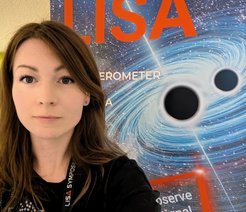MPA Fellow Valeriya Korol Joins the LISA Science Team
Valeriya Korol, a postdoctoral fellow at the Max Planck Institute for Astrophysics (MPA), has been selected to join the LISA Science Team to help ESA shape the scientific potential of its flagship and first-of-its-kind gravitational-wave mission, the Laser Interferometer Space Antenna (LISA). She is the only early career scientist to be selected for the panel.

LISA aims to detect gravitational waves from space, opening an entirely new gravitational-wave window. Unlike ground-based detectors, which have already observed waves from merging stellar-mass black holes and neutron stars, LISA will be sensitive to much larger black holes, millions of times heavier than our Sun, as well as binary systems of stellar remnants like white dwarfs within our own Milky Way. This unique capability will allow scientists to explore the formation and growth of massive black holes and to study the final stages of evolution of stars in binaries in ways previously impossible. Also unique to LISA is the detection of gravitational waves from stellar black holes swirling around massive ones in galactic nuclei, which will probe the geometry of space-time and test gravity in its foundations.
The LISA Science Team represents the scientific community for which ESA builds the LISA mission and will be consulted on all matters relating to the science output of the mission. This includes the mission's sensitivity, the data products that will be released, and the structure of the initial verification phase during which scientific panels will analyse the first data. The team, composed of 18 scientists, includes 11 appointed by ESA from member state countries, 6 appointed by NASA, and 1 representative from the International LISA Consortium. The science team is carefully selected to encompass a broad range of expertise, ensuring diversity and representation from various member states. The LISA Science Team will be renewed every three years and will continue its mission-critical work well into the 2040s.
Valeriya Korol's selection recognizes her scientific contributions and her leadership role within the LISA Consortium. Alongside Guido Müller from the Albert Einstein Institute in Hannover, Valeriya will represent Germany on this team.












